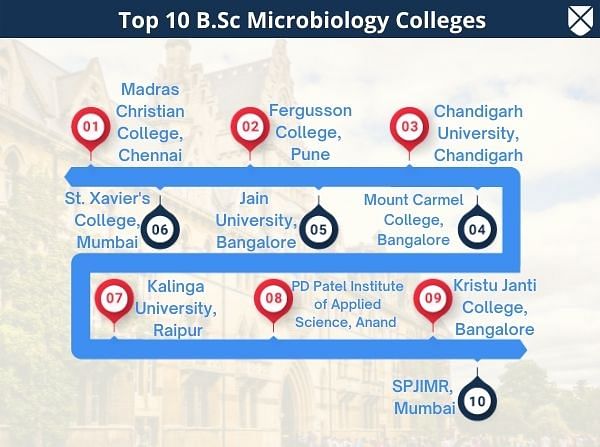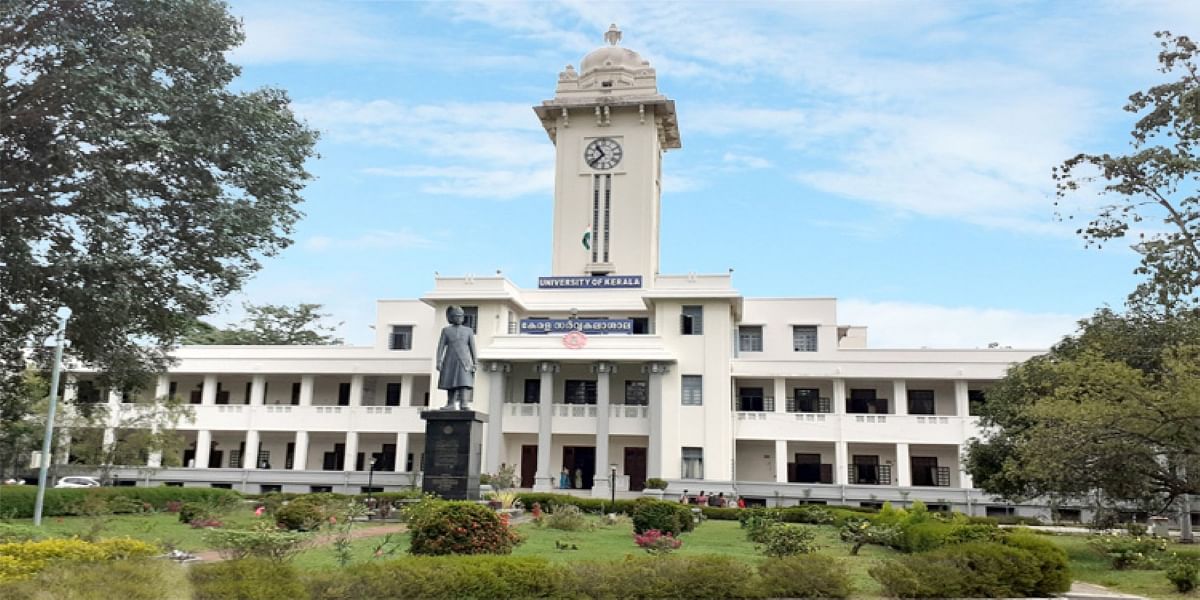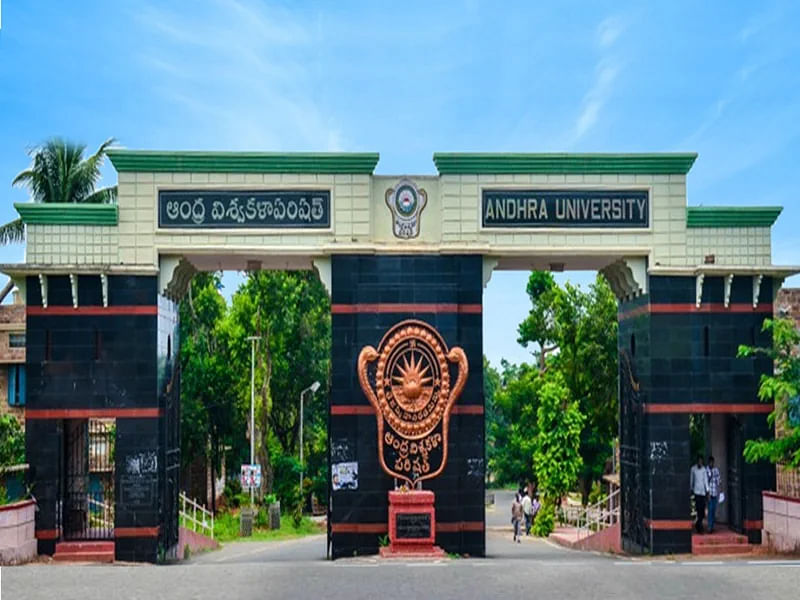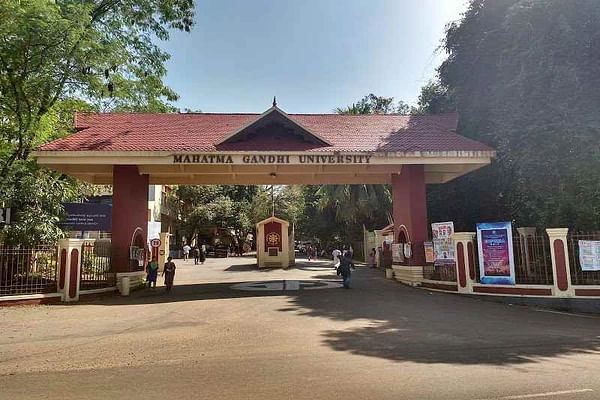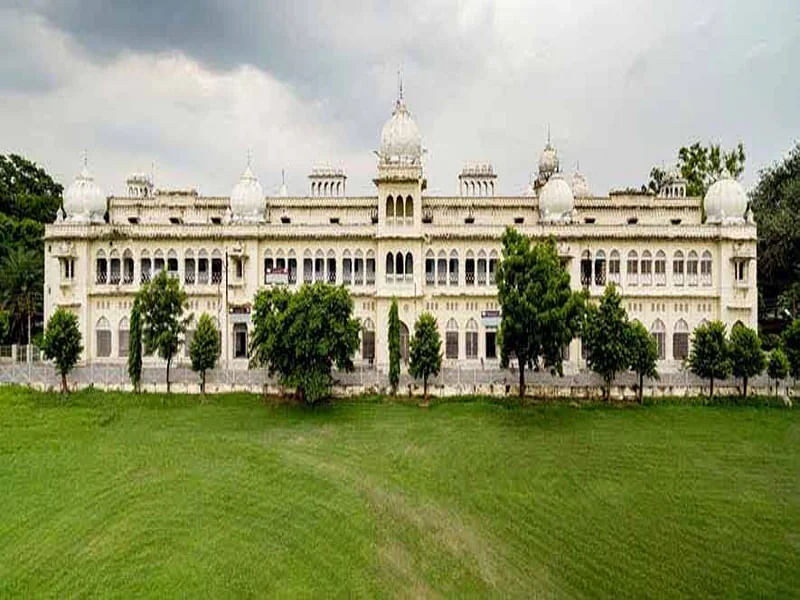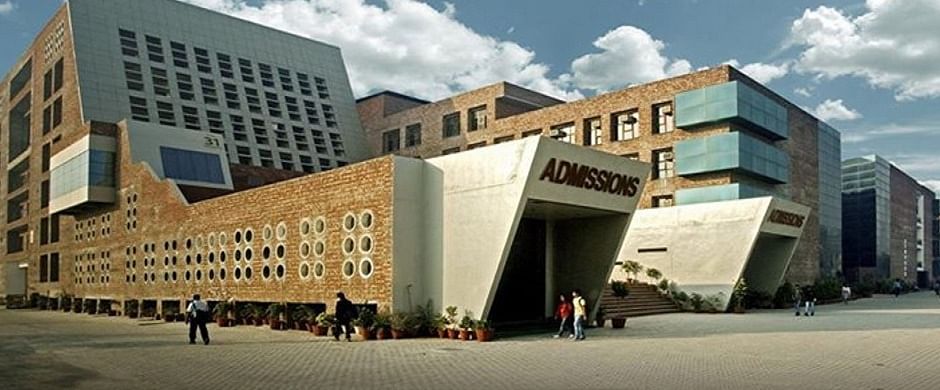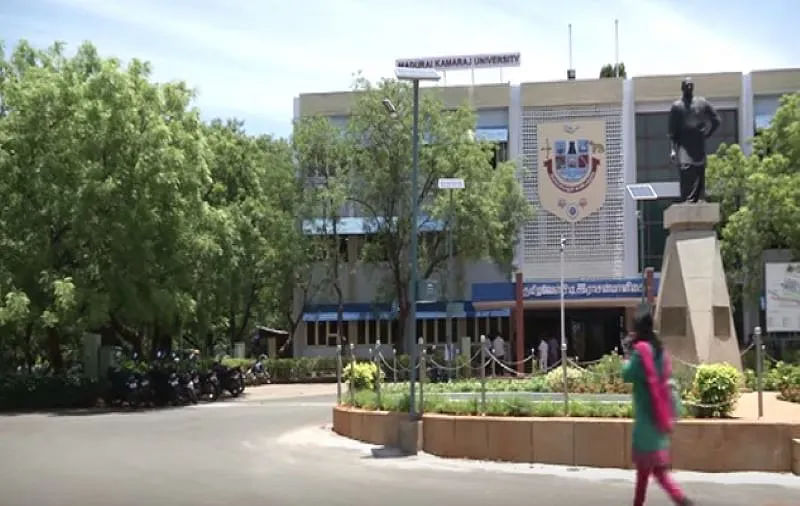B.Sc Microbiology: Course Details, Admission, Fees, Eligibility

B.Sc. Microbiology is a 3-year undergraduate course that focuses on the study of microorganisms such as the biology of bacteria, viruses, fungi, and protozoan parasites through practical and theoretical learning. Graduates from this course can acquire several employment opportunities in public and private sectors as biochemical scientists, clinical research associates, food technologists, healthcare scientists, etc.
Table of Contents
- About B.Sc Microbiology
- Eligibility Criteria for B.Sc Microbiology
- How To Get Admission for B.Sc Microbiology?
- Who Should Pursue a B.Sc Microbiology?
- Types of B.Sc Microbiology
- Popular Entrance Exams for B.Sc Microbiology
- Top 10 B.Sc Microbiology Colleges in India
- Fee Structure for B.Sc Microbiology
- Integrated B.Sc Microbiology
- Syllabus and Subjects for B.Sc Microbiology
- Why Choose B.Sc Microbiology?
- B.Sc Microbiology Course Comparison
- Preparation Tips for B.Sc Microbiology
- Scope For Higher Education
- Salary of a B.Sc Microbiology
- Career Options After B.Sc Microbiology
- Skills That Make You The Best Microbiologist
B.Sc Microbiology Course Details
| Degree | Bachelors |
| Full Form | Bachelor of Science in Microbiology |
| Duration | 3 Years |
| Minimum Percentage | A minimum of 50% marks in 10+2 exams from a recognized board. |
| Average Fees | INR 10,000-3,00,000 Per Year |
| Similar Options of Study | B.Sc (Biotechnology), B.Sc (Genetics), B.Sc (Biochemistry) |
| Average Salary | INR 2-5.5 LPA (Source: Ambition Box) |
| Employment Roles | Biomedical Scientists, Research Assistants, Environmental Microbiologists |
About B.Sc Microbiology
BSc Microbiology course is known as a bachelor of science in Microbiology consists of 3 years and covers in-depth research on microorganisms and how they affect the human body.
B.Sc Microbiology subjects like immunology, biotechnology, microbial physiology, basic microscopy, and instrumental are highly knowledge-based modules that prepare the students to develop skills and experience based on experimentation in labs. BSc in Microbiology job scope is vast to provide career paths in various sectors including – medicine, pharmacy agriculture, food industry, research, environment, etc.
Also Read: List of Medical Courses after 12th without NEET
Eligibility Criteria for B.Sc Microbiology
For admission into B.Sc Microbiology course aspirants require to complete class 10+2 or pass examinations from any recognized school or board. Some colleges ask for a 50% minimum as their criteria for scoring marks to qualify for the examinations. Age also plays a vital factor in the admission process as aspirants need to be 17 - 25 years old.
How To Get Admission for B.Sc Microbiology?
The admission procedure for the B.Sc Microbiology course can either be via merit or an entrance exam score. Aspirants must initially accomplish excellence in their entrance exams to clear the final admission process. The course falls under the umbrella of B.Sc and henceforth has a similar admission process. The typical steps for B.Sc Microbiology are given below as follows:
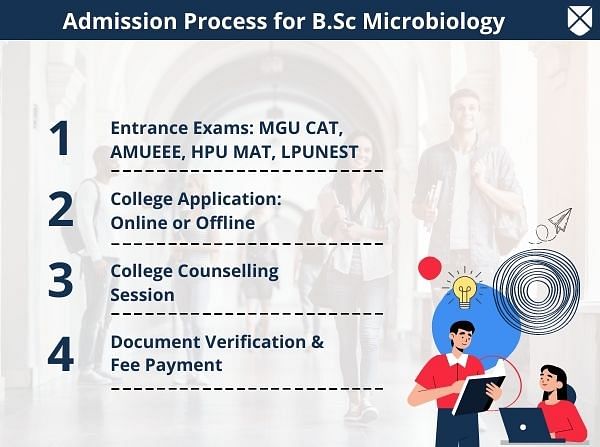
How to Apply?
Colleges and universities have adopted the admission process's online methods, which the aspirants could apply from anywhere in the country without taking a risk. The manual admission methods are too available for the aspirants who wish to apply to the campus.
Selection Process
On being selected based on merit or entrance examinations, there will be a final round of group discussion or personal interview before confirmation of admission.
Read More on B.Sc Admission
Who Should Pursue a B.Sc Microbiology?
B.Sc Microbiology is a 3-year undergraduate course that is all about the deep study of microbes and different types of viruses or bacteria. The students who want to attain knowledge about bacteria creatures, their types, and their functioning can go further to pursue this course. Those students who are interested in research labs, food processing plants, etc can also pursue this course.
When To Do B.Sc Microbiology?
For pursuing this B.Sc Microbiology course, students must pass their 12th exam from a recognized board or university with relevant subjects.
Types of B.Sc Microbiology
B.Sc Microbiology is in high demand nowadays and that's why the course gives the students an opportunity to complete their B.Sc Microbiology course in any of the three types i.e B.Sc Microbiology Full-time, B.Sc Microbiology Integrated, B.Sc Microbiology Distance Learning.
Full-Time B.Sc Microbiology
A Full-time B.Sc Microbiology is a 3 years course. The students who have completed their 12th or equivalent exams with a minimum of 55-60% marks from a recognized university or board. There is an entrance exam also which has to be cracked to take admission to this course. The average course fees range from INR 4,000- 2 LPA.
Part-Time B.Sc Microbiology
A Part-time B.Sc Microbiology is a 3-5 years course in which the students who are earning for their needs or requirements can take admitted to the relevant colleges that provide this mode. This course is all about having a scheduled time for completing the lectures and assignments. The average fees range from INR 30,000 to 1 LPA.
Distance B.Sc Microbiology
A Distance B.Sc Microbiology is a 3 years course that takes admission if the students have a minimum of 45-50% marks in their 12th exams and must have biology as a subject. The average course fee for this B.Sc Microbiology is quite less than the Full-time B.Sc Microbiology and Integrated B.Sc Microbiology. This course is specially designed for the working professional who can't pursue the full-time course.
Popular Entrance Exams for B.Sc Microbiology
Aspirants pursuing B.Sc in Microbiology across the country are primarily highly motivated. There are both national and state-level entrance examinations in the country. Aspirants who took science subjects like biology, chemistry, and physics are eligible to pursue this entrance examination. Aspirants for B.Sc courses may select the colleges they would like to get admitted to based on their entrance exam marks. The most popular entrance exams are listed below:
A Quick Glance at the B.Sc Microbiology Entrance Exams
The eligibility criteria for the B.Sc applicants appearing for the entrance exams are entirely dependent on the conduction body; hence it varies. Listed are some of the best common knowledge for pursuing the entrance examinations:
- The questions would be complete for science subjects like physics, chemistry, and biology.
- The papers are objective types; the questions asked will be from physics, chemistry, and mathematics.
- The exam will be offline or online, depending on the examinee.
- The questions would be set to the standards of the professionals.
Top 10 B.Sc Microbiology Colleges in India
Below is the list of the top 10 Bsc Microbiology Colleges and Universities in India:
|
NIRF Ranking |
Top College for B.Sc Microbiology |
| 1 | Madras Christian College Chennai |
| 2 | Fergusson College Pune |
| 3 | Chandigarh University |
| 4 | St Xavier College Mumbai |
| 5 | Jain University Banglore |
| 6 | Mount Carmel College Bangalore |
| 7 | Kalinga University Raipur |
| 8 | PD Patel Institute of Applied Science Anand |
| 9 | Kristu Jayanti College Banglore |
| 10 | SP Jain Institute of Management and Research |
Top B.Sc Microbiology Colleges in New Delhi
India’s capital city is home to some of the best institutions for B.Sc Microbiology in India. Check the table below for the top B.Sc Microbiology colleges in New Delhi:
| Sl.No | Institution |
| 1 | University of Delhi |
| 2 | Institute Of Public Health And Hygiene |
| 3 | SGT University |
| 4 | Manav Rachna University |
| 5 | SGT University, Faculty Of Allied Health Sciences |
Read More: B.Sc Microbiology Colleges in Delhi
Top B.Sc Microbiology Colleges in Pune
Pune also has some of the best institutions for B.Sc Microbiology in India. Check the table below for the top B.Sc Microbiology colleges in Pune:
| Sl.No | Institution |
| 1 | Abeda Inamdar Senior College |
| 2 | Fergusson College |
| 3 | Sinhgad College of Science |
| 4 | Yashwantrao Mohite College |
| 5 | Annasaheb Magar College |
Read More: B.Sc Microbiology Colleges in Pune
Top B.Sc Microbiology Colleges in Chennai
Tamil Nadu’s capital city is home to some of the premier institutions for B.Sc Microbiology in India. Check the table below for the best B.Sc Microbiology colleges in Chennai:
Read More: B.Sc Microbiology Colleges in Chennai
Top B.Sc Microbiology Colleges in Bangalore
The capital city of Karnataka is renowned around the country for colleges offering top B.Sc Microbiology programmes. Check the table below for the best B.Sc Microbiology colleges in India:
| Sl.No | Institution |
| 1 | Jain University |
| 2 | Mount Carmel College |
| 3 | St. Joseph's College |
| 4 | The Oxford College of Science |
| 5 | Maharani Lakshmi Ammanni College for Women |
Read More: B.Sc Microbiology Colleges in Bangalore
Top B.Sc Microbiology Colleges in Kolkata
West Bengal’s capital city, Kolkata, has some of the best colleges for B.Sc Microbiology courses in India. Check the table below for the best B.Sc Microbiology colleges in Kolkata:
| Sl.No | Institution |
| 1 | GNIPST |
| 2 | JIS University |
| 3 | Hooghly Women's College |
| 4 | Brainware University |
| 5 | St Paul's Cathedral Mission College |
Read More: B.Sc Microbiology Colleges in Kolkata
Top B.Sc Microbiology Colleges in Hyderabad
The Telangana state capital has some premier institutions in the country for B.Sc Microbiology courses in India. Check the table below for the top B.Sc Microbiology colleges in Hyderabad:
| Sl.No | Institution |
| 1 | Avanthi Degree College |
| 2 | St Pious Degree College for Women |
| 3 | Avanthi Degree College |
| 4 | SN Vanitha Mahavidyalaya |
| 5 | Annie Besant College for Women |
Read More: B.Sc Microbiology Colleges in Hyderabad
Top B.Sc Microbiology Government Colleges
There are several top Government Colleges offering quality B.Sc Microbiology programmes across the country. Check the table below for the top B.Sc Microbiology government colleges in India:
| Sl.No | Institution |
| 1 | Government City College, Hyderabad |
| 2 | Padmashri Vikhe Patil Arts Science and Commerce College, Ahmednagar |
| 3 | West Bengal State University [WBSU], Barasat |
| 4 | Kamla Raja Girls Government PG College, Gwalior |
| 5 | Modern College of Arts, Science and Commerce, Pune |
Top B.Sc Microbiology Private Colleges
India has seen significant growth in the number of quality B.Sc Microbiology private colleges that offer some of the best programmes in the country. Check the table below for the top B.Sc Microbiology private colleges in India:
| Sl.No | Institution |
| 1 | Villa Marie College For Women, Hyderabad |
| 2 | The Oxford College Of Science - [TOCS], Bangalore |
| 3 | Bhaktavatsalam Memorial College For Women, Chennai |
| 4 | Techno India University, Kolkata |
| 5 | Brainware University, Kolkata |
Fee Structure for B.Sc Microbiology
The average fee for BSc in Microbiology is INR 10,000 - 3 LPA. The fee may fluctuate based on the college deciding upon their ranking from top-level to the middle order depending on the infrastructure and academic faculty of colleges and universities. Students can pay the fees in two formats. One is semester-wise, and the other is annual via any payment method preferred by the aspirant's guardians or parents by cash or cheque.
| College | Fee Structure |
| Madras Christian College, Chennai | INR 1 LPA |
| Fergusson College, Pune | INR 90,000 PA |
| Chandigarh University, Chandigarh | INR 95,000 PA |
| St Xavier College, Mumbai | INR 50,000 PA |
| Jain University, Banglore | INR 60,000 PA |
| Mount Carmel College, Banglore | INR 75,000 PA |
Integrated B.Sc Microbiology
Integrated B.Sc Microbiology is a 5 years course including UG and PG. The eligibility criteria for this course are the same as the Full-time B.Sc Microbiology course that is the students must pass 12th or equivalent exams with 55% marks. The average course fees range from INR 3 LPA - 4.47 LPA.
Syllabus and Subjects for B.Sc Microbiology
Aspirants eager to achieve the B.Sc Microbiology degree need a general certificate from secondary education including science, English, maths, and the top levels with biology and chemistry combined. Essential syllabus and subjects of study:
- Immunology
- Biotechnology
- Biochemistry
- Microbial Physiology
- Microbial Genetics
- Molecular Biology
- Biophysics and Instrumentation
- Basic Microscopy and Instrumentation
Read More: BSc Microbiology Syllabus and Subjects
Why Choose B.Sc Microbiology?
Selection, of course, is very complicated. Getting the right course and its required guidance is a necessity in today's time. Below are a few topics that discuss the importance of "why choose B.Sc Microbiology"?

What is B.Sc Microbiology All About?
B.Sc Microbiology course is a duration of 3 years and focuses on the relevant subject principle of pure science like microbial physiology, immunology, microbial genetics, and molecular biology preparing aspirants with a strong background for job opportunities such as research assistants, food, quality assurance technologist, medical technologists, and biomedical scientists.
What does a Microbiologist Do?
A degree in B.Sc Microbiology graduates can work in various sectors like public-funded research organizations, forensic laboratories, environmental curing organizations, pharmaceuticals, and other industries.
Microbiologists: Microbiologists' center of attraction is to identify these organisms' growth and their characteristics to prevent diseases and infections. These brilliant scientists acknowledge organisms live, reproduce and interact with themselves in these environments.
Several other employment roles that can be obtained upon course completion are given below.
- Research Assistant
- Food, Industrial, or Environmental Microbiologists
- Quality Assurance Technologists
- Sales or Technical Representative
- Clinical and Veterinary Microbiologists
- Medical Technologists
- Biomedical Scientist
- Clinical Research Associate
Reasons Why B.Sc Microbiology can fetch you a rewarding career?
Ahead of solving the problem triggered by microbes, microbiologists need to know how these microbes behave. A degree in B.Sc Microbiology pays its aspirants flourishingly well in India and abroad, preferring experience and skill.
Decent Salary and Job Growth: According to the payscale, an aspirant's salary with a graduate degree could range from INR 2.5 to 5 LPA. Salary varies on the experience and work skills of the aspirants.
Job offers for B.Sc have enormous opportunities for aspirants from B.Sc Microbiology in countries like Japan, China, the USA, England, etc.
Read More: BSc Microbiology Jobs and Scope
B.Sc Microbiology Course Comparison
B.Sc Microbiology stands for Bachelor of science and is typically catered to students interested in and inclined towards Microbiology and Biotechnology. Below is a comparison of the B.Sc Microbiology course with other courses:
B.Sc Microbiology vs B.Sc Biotechnology
The table below showcases the differences between B.Sc Microbiology and B.Sc Biotechnology:
| Course | B.Sc Microbiology | B.Sc Biotechnology |
| Full-Form | Bachelor of Science in Microbiology | Bachelor of Science in Biotechnology |
| Course Duration | 3 Years | 3 Years |
| Eligibility | Minimum of 50% marks from a recognised board. | Minimum of 55-60% marks from a recognised board. |
| Entrance Exams | MGU CAT, AMUEEE | SET, IIT JAM, JCECE |
| Top Colleges | AILS, Delhi University, MAC, JECRC University | Fergusson College Pune, JMI, SXC |
| Fees | INR 10,000-3 LPA | INR 50,000 to 1 LPA |
| Job Opportunities | Clinical Research Associate, Biomedical Scientist, Microbiologists. | Medical Coder, Quality Control Analyst, Research Analyst. |
Read More: B.Sc Biotechnology
Preparation Tips for B.Sc Microbiology
Common preparations point for the aspirants preparing for the entrance exams and course of B.Sc Microbiology are:
Knowledge of the Subjects: The primary step required in preparing the course is to glance at the course's subject line.
Reference of Research Books and Articles: Essential requirements for the B.Sc Microbiology course on practical subjects are references to research books and articles.
Participating in Workshops: Countless research agencies glance up the skills which are required for this course.
Practise Makes Perfect: To excel in this course, aspirants require more practice of the concept thoroughly during the exam period.
Scope For Higher Education
B.Sc Microbiology degree grants aspirants a career in several fields: environmental organizations, forensic scene laboratories, healthcare organizations with higher education institutions like public-funded research organizations, pharmaceuticals, food, and drink institutes. The best courses aspirants can pursue after B.Sc includes:
Salary of a B.Sc Microbiology
According to payscale, the average salary of B.Sc Microbiology aspirants is INR 2-5.5 LPA (Source: Ambition Box). This value varies on the aspirant's experience and skill on the job.
Read More: BSc Microbiology Salary
Career Options After B.Sc Microbiology
After completing a B.Sc Microbiology degree, an individual aspirant can work both in the public and private sectors depending on their preferences. Listed below are the popular industries that employ microbiologists:
- Military
- Health care Institutions
- Who
- Unesco
- Space and Research Agencies
- Agriculture fields
- Organic Industries
Listed below are the public sectors that offer employment for microbiologists in India:
- Pharmaceutical-Biotech Industries
- Academia (Colleges & Universities)
- Clinical (Diagnostic) Laboratories
- Private Hospitals
- Research Organization
- Environmental Agency
- Food Industry
- Beverage Industry
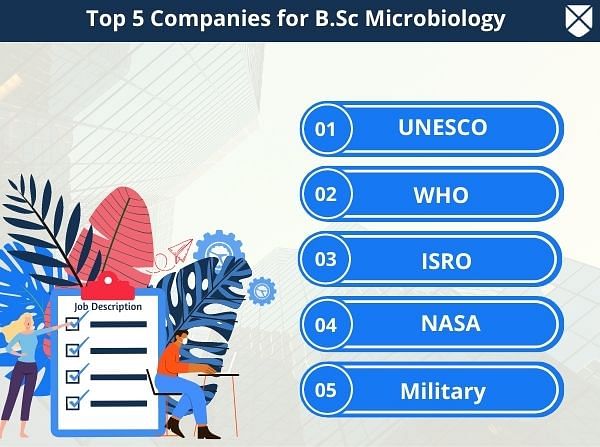
Skills That Make You The Best Microbiologist
B.Sc Microbiologists have proven to be a prime exercise in biology, identifying how organisms cause diseases and uncovering cures for these diseases using microbes for industrial motives. B.Sc Microbiologists can get into government and private enterprises such as health care defense, etc. Some of the skills that make will make one the best Microbiologists are listed below:
- Team working
- Attention to details
- Independence
- Numerical skills
- Excellent IT skills
- Analytical skills
- Patience
- Decisiveness
| Top Trending B.Sc Courses | |
| BSc Nursing | B.Sc Psychology |
| BSc Agriculture | B.Sc Forensic Science |
| BSc Computer Science | B.Sc IT |
| BSc Biotechnology | B.Sc Chemistry |
Check other important B.Sc Courses
Top B.Sc Microbiology Colleges
Top Science Entrance Exams
B.Sc Microbiology Fee Structure
FAQs on B.Sc Microbiology
Q: What is BSc Microbiology?
B.Sc Microbiology is a study of microorganisms, microbial physiology, immunology, microbial genetics, and molecular biology and deals with research on bacteria, viruses, protozoa, and fungi.
Q: Is BSc microbiology a good career?
B.Sc. in microbiology is an excellent course for students who want to work in various pharmaceutical institutions, hospitals, medical Laboratories, and Research Institutions as biochemical scientists, clinical research associates, food technologists, healthcare scientists
Q: What is the salary after BSc Microbiology?
The salary after BSc Microbiology ranges between INR 3.3 - 4.5 LPA.
Q: What is the eligibility for the BSc Microbiology course?
B.Sc Microbiology course requires aspirants to qualify 10+2 from any recognized board with a minimum score of 50%.
Q: What is the scope of BSc Microbiology?
The scope of BSc Microbiology is extensive with graduates getting recruited in various fields such as medicine, pharmacy, clinical research, dairy industry agriculture, water industry, and Chemical Technology.
